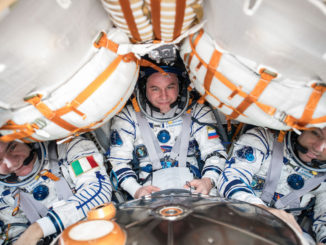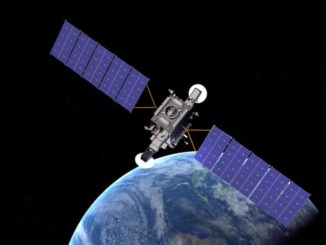A Russian Soyuz rocket rolled out to a launch pad Monday at the Baikonur Cosmodrome in Kazakhstan, ready for final inspections, checkouts and fueling before liftoff Thursday with a Progress supply ship bound for the International Space Station.
The Soyuz-2.1a launcher emerged from a hangar at the Baikonur Cosmodrome just after sunrise Monday, riding a mobile railcar across the Kazakh steppe to Launch Pad No. 31. A hydraulic lift raised the launcher vertical on pad 31, and gantry arms rotated into position around the rocket to allow workers access to the vehicle for final pre-launch preparations.
Launch is scheduled for 10:26:22 a.m. EDT (1426:22 GMT; 7:26:22 p.m. Baikonur time) Thursday to kick off a three-hour pursuit of the space station. The launch time is set to occur around the time the research outpost flies over Baikonur.
After shedding its four liquid-fueled first stage boosters about two minutes after liftoff, the Soyuz rocket continue firing its core stage until nearly five minutes into the mission. An upper stage will finish the task of placing the Progress MS-15 cargo carrier into orbit, then deploy the supply ship around nine minutes after launch.
The Progress MS-15 resupply freighter will unfurl its solar panels and navigation antenna, then begin a series of thruster firings to adjust its altitude to match that of the space station. A final radar-guided automated rendezvous sequence will steer the spacecraft on an approach to the Pirs docking compartment on the station’s Russian segment.
The automated docking is scheduled for 1:47 p.m. EDT (1747 GMT), delivering some 2.8 tons (2.6 metric tons) of fuel, food, supplies and other equipment to the research outpost and its five-person crew.
Russian ground teams loaded 3,351 pounds (1,520 kilograms) of dry cargo into the cargo freighter’s pressurized compartment, according to Roscosmos, the Russian space agency. Roscosmos says there’s around 1,322 pounds (600 kilograms) of propellant aboard the Progress MS-15 spacecraft for transfer into the space station’s tanks, along with 926 pounds (420 kilograms) of water and 101 pounds (46 kilograms) of compressed gas to replenish the space station’s breathing air.
The Progress MS-13 supply ship, which docked with the space station Dec. 9, departed the Pirs docking port July 8 to clear the way for the arrival of the new cargo freighter. Once it docks Thursday, the Progress MS-15 spacecraft will remain linked with the space station until December, when it will detach and burn up in Earth’s atmosphere.
Russian cosmonauts Anatoly Ivanishin and Ivan Vagner will monitor the Progress MS-15 supply ship’s approach to the space station. They will be ready to intervene and take manual control using a remote command panel inside the station.
Ivanishin and Vagner are joined by Expedition 63 commander Chris Cassidy and NASA astronauts Bob Behnken and Doug Hurley aboard the International Space Station.
Cassidy, Ivanishin and Vagner launched in April aboard a Russian Soyuz crew capsule. They are scheduled to return to Earth in October.
Behnken and Hurley launched May 30 from the Kennedy Space Center in Florida on the first flight of SpaceX’s Crew Dragon spacecraft with astronauts. They reached the station May 31, and are gearing up for undocking as soon as Aug. 1, followed by re-entry and splashdown off the Florida coast Aug. 2.
Photos of the Soyuz-2.1a rocket’s rollout to the launch pad at Baikonur are posted below.



















Email the author.
Follow Stephen Clark on Twitter: @StephenClark1.



